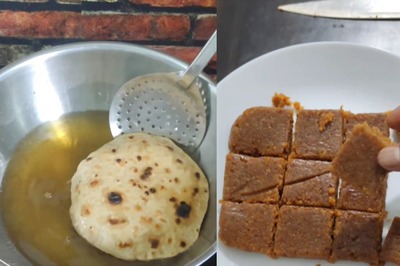
views
New Delhi: Worried over incidents of heinous crime committed by children, the central government is all set to introduce ‘student police cadet’ in government schools. The special school police force will not only address ‘anti-establishment behaviour’, but will also help curb issues like substance abuse and under-age sex.
The Office Memorandum of Home Ministry, a copy of which is with News18, states that ideological and religious radical organisations are focusing on youth and children for new recruits, unemployment is high, inequalities are on the rise and quality of education is questionable. Thus, to “recognise and nip the issues in the bud”, a nationwide Student Police Cadet programme will be rolled out by Union Home Minister Rajnath Singh this month in Kendriya Vidyalayas and Navodaya Vidyalayas.
The initiative, which is based on the Kerala model of Student Police Cadet (SPC), shall bring in an interface between the police and students for the objectives mentioned in the Office Memorandum. “This shall contribute to nation building by imparting values to students to become responsible citizens,” it said.
An initiative of the Ministry of Home Affairs, proposed as the centrally sponsored scheme with an estimated expenditure of Rs 430 crores, it was reviewed by Home Minister Rajnath Singh on February 15, 2018.
The functioning of SPC is similar to National Cadets Corps and National Service Scheme. It is meant to target the students of classes 8 and 9 in various schools of the country. It may incorporate one period per week during the school hours and can be treated as an extra-curricular activity.
For Law Abiding Youth, an Interface with Police
According to the document accessed by News18, the SPC has been envisaged as a program with practical approach to make students understand the significance of rule of law, democratic governance, citizens’ rights and responsibilities. “It establishes a mechanism for regular interaction between local police and school students on a wide range of topics, including the basics of policing. It, thus, lays the foundation for harmonious relationship between the police and the society,” it said.
Another objective of this program is to address many of the problems that children faced today – substance abuse, deviant and the anti-establishment behaviour, under age sex, etc. Further, heinous crime by children are rising on an alarming scale. Ideological and religious radical organizations are focusing on youth and children for new recruits, unemployment is high, inequalities are on the rise and quality of education is questionable. “If these issues are not recognized and nipped in the bud, they could not only lead to severe internal security problem, but also raise the costs and challenges of good policing with serious consequences for the future of the country,” said the copy of the memorandum.
The guidelines of the program state that the states should train their officers in various police stations by using the services of the Master Trainers – trained by Bureau of Police Research and Development – and the model curriculum developed by them. The states can also involve officials from various departments who can be trained by the MTs – such as Youth Affairs, Sports, Civil, Defense etc. The States shall have the liberty to adapt to the curriculum shaped by the Bureau as per their culture and traditions.
The guidelines further lay down that the states can utilize the services of the trained personnel to conduct classes for students of classses 8 and 9 say, once a month, for two years “to impart value based knowledge that we are seeking to achieve through the SPC program to enable the students in becoming better students and support the police as required.”
For Nation Building
The scheme is envisioned to be an early intervention strategy that would encourage high school students to be active and committed participants in the task of nation development.
The note says that “among the SPC students it shall increase respect for law and law abiding behavior as a way of life. Strengthen social, skill, emotional, physical and environmental quotients of SPC students. It is expected to strengthen gender equality through facilitating equal performance opportunities for both boys’ and girls’ cadets. Create safer school environments and communities. It will increase team spirit and have police acting as mentors. The program is envisioned to increase confidence, self-discipline, and a more responsible behavior among students.”
The Navodaya Vidyalayas Samiti has informed to start program in a phased manner in JNVs. The Kendriya Vidyalaya Sangathan informed the government that they already have program like Bharat Scouts and Guides movement to impart training for emotional and physical strength. NCC program is already implemented to instill patriotism and discipline.
Curriculum and Pedagogy
The Bureau of Police Research and Development is preparing the list of topics and training material since August 2017 and NCERT has been providing academic support to them in this task. Along with KVS and NVS the CBSE is also expected to encourage students in the program that encourage them to be good citizens. The program does not intend to increase the burden of students – “It is expected that one class per month shall suffice to cover the curriculum. The outdoor activities, part of the curriculum, shall take half a day twice a month. The outdoor activities can be conducted on weekends or after school hours.
Funds and Evaluation
The Category A states are expected to bear 10% and category B are expected to bear 40% of the total budget under their respective Action Plan under this program. In case the state does not want to participate, no funds shall be allocated for the program. The government is expected to conduct an evaluation of the implementation of the program through an external agency one year after its operationalization.

















Comments
0 comment